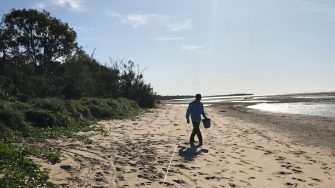Reaching sustainability targets through citizen science
A long-standing partnership with UNSW Science demonstrates how Australia can track its progress towards SDGs using citizen science.
A long-standing partnership with UNSW Science demonstrates how Australia can track its progress towards SDGs using citizen science.

According to the United Nations Framework Convention on Climate Change (UNFCCC), the future of humanity faces three interlinked crises: climate change, pollution and biodiversity loss.
Escalating levels of plastic pollution pose a significant global environmental challenge – impacting ecosystems, societies, economies and public health.
“Communities around the world are taking personal steps to reduce their plastic consumption,” says Bella Charlesworth, who works within a team at the UNSW School of Biological, Earth & Environmental Sciences on tracking plastics at sea.
“Yet, the systemic challenge remains. And we needed a new method to measure environmental and collective progress.”
Partnering with the Tangaroa Blue Foundation, Charlesworth and Dr Jordan Gacutan, from the UNSW Solutions for Estuarine and Coastal Stressors (SEACS) lab, showed that Australia could use citizen science data to report on Sustainable Development Goals (SDGs) progress in Australia.
World leaders united in 2015 to develop the 17 SDGs that would best address the greatest issues facing society, the environment and the economy. Within each SDG is a target, and process towards achieving that target is measuring using specific indicators.
“The most recent SDG progress report for Australia was released in 2020,” says Charlesworth. “But it didn’t report on marine pollution.”
This reporting on marine pollution would fall under SDG 14.1, which aims to “prevent and significantly reduce marine pollution of all kinds by 2025”. The indicator to track progress towards this goal involves measuring the density of plastic debris nationally.
Australia has a coastline stretching more than 30,000 km, with engaged communities that care about its health.
“We’ve shown that the data from beach clean- ups can be used to support estimates of plastic debris density across many years,” Dr Gacutan says. “This also serves as a benchmark for monitoring the effectiveness of national and state level management strategies.”
Australia hosts the largest citizen science database of marine debris in the southern hemisphere: the Australian Marine Debris Initiative (AMDI) Database, which is coordinated by the Tangaroa Blue Foundation. For the past 20 years, individuals and community groups have completed beach clean-ups and contributed their data to the database.
The partnership between the foundation and UNSW Science came from the common recognition of the need for evidence to tackle the challenge of plastic pollution. Dr Gacutan focused much of his UNSW PhD on the AMDI Database. He, Charlesworth and the team have worked together since 2019 to analyse and communicate its findings – ultimately to inform evidence-based decision making.
This includes a risk assessment for plastics within the NSW Marine Estate, auditing waste infrastructure across Melbourne, establishing long-term monitoring for marine debris across Queensland coast, and many more.
Heidi Tait, CEO of Tangaroa Blue Foundation, says, “We know the incredible value of citizen science in addressing plastic pollution. Our collaboration with UNSW demonstrates how data collected by everyday people can play a crucial role in monitoring plastic debris on beaches, supporting national reporting on SDGs.”
The analysis of 3,144 clean-up events between 2014 and 2019 provides the national-scale, quality-controlled data needed to produce the indicator for plastic pollution.
As the world works towards a global plastic treaty, few countries have reported on the SDG indicator in any systematic or representative manner.
While this could be because of limited access to plastic debris data, Dr Gacutan says citizen science initiatives are actively collecting debris from beaches around the world.
“This offers a suite of potential data sources for reporting,” he says.
“Data collection by the citizen science community also empowers people to address this global issue by actively removing debris.
“As part of this process, individuals can contribute valuable data to inform management and policy decisions at local, national, and international levels.”
This includes identifying areas that require further intervention, as well as supporting risk assessments of plastic pollution and monitoring the effectiveness of plastic reduction policies.
“With clear communication, official recognition and investment into these initiatives, collaboration between the government agencies responsible for SDG reporting and the citizen science community can drive progress in shaping a sustainable future,” says Charlesworth.
“This opens new doors for data-driven policymaking.”
Impact stories